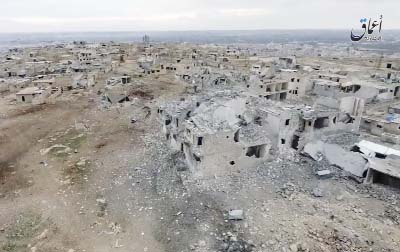
AP, Beirut :
Nearly two months into the assault, Turkey has become bogged down in an unexpectedly bloody fight to retake the Islamic State group’s last stronghold in northern Syria. It has been forced to pour in troops, take the lead in the battle from its Syrian allies and reach out to Russia for aerial support.
The fight for al-Bab underscores the precarious path Ankara is treading with its foray in to Syria, aimed against both IS militants and Syrian Kurdish fighters. The assault on the town had already driven a wedge between Turkey and the United States, and now the realignment toward Moscow – which supports the government in Syria’s civil war – further tests Ankara’s alliance both with Washington and with the Syrian opposition.
The battle itself has proven grueling.
Nearly 50 Turkish soldiers have been killed in its Syria operation, most of them since the al-Bab assault began in mid-November – including 14 killed in a single day. The militants have dug in, surrounding the town with trenches, lining streets with land mines and carrying out painful ambushes and car bombings against the besieging forces. Each time Turkish-backed Syrian opposition fighters have thrust into the city, they’ve been driven out. More than 200 civilians are believed to have been killed since the attack began Nov. 13. Mud and cold rain have only made it more of a slog.
“The battle for al-Bab has been mostly about killing civilians and destroying the city, whether by Daesh or the Turks,” said Mustafa Sultan, a resident of al-Bab and a media activist who has been covering the fight. He used the Arabic acronym for IS.
“The town is almost half destroyed. Daesh takes cover in hospitals, schools and these end up getting targeted,” he said. The Turkish military says it takes great care not to harm civilians, halting operations that could endanger non-combatants. Capturing al-Bab is essential to Ankara’s goals in Syria.
Turkey, which for years supported the Syrian opposition drive to oust President Bashar Assad, has recalibrated its priorities toward fighting Islamic State militants who turned their terror against the Turkish state and thwarting Kurdish aspirations for autonomous rule along Syria’s border with Turkey. If al-Bab is retaken, it would break the IS presence near the border and plant a Turkish-backed presence between Kurdish-held territory to the east and west, preventing them from linking.
For the U.S., the al-Bab assault risks causing direct confrontation between Turkish troops and Syrian Kurdish forces, which are leading a U.S.-backed offensive toward the de facto IS capital, Raqqa. Washington supports and relies on the Kurds in the fight against IS the past two years.
Last month, Ankara protested to Washington that its NATO ally was providing no help in al-Bab. A day later, Turkey said Russia carried out three airstrikes in the al-Bab area.
Nearly two months into the assault, Turkey has become bogged down in an unexpectedly bloody fight to retake the Islamic State group’s last stronghold in northern Syria. It has been forced to pour in troops, take the lead in the battle from its Syrian allies and reach out to Russia for aerial support.
The fight for al-Bab underscores the precarious path Ankara is treading with its foray in to Syria, aimed against both IS militants and Syrian Kurdish fighters. The assault on the town had already driven a wedge between Turkey and the United States, and now the realignment toward Moscow – which supports the government in Syria’s civil war – further tests Ankara’s alliance both with Washington and with the Syrian opposition.
The battle itself has proven grueling.
Nearly 50 Turkish soldiers have been killed in its Syria operation, most of them since the al-Bab assault began in mid-November – including 14 killed in a single day. The militants have dug in, surrounding the town with trenches, lining streets with land mines and carrying out painful ambushes and car bombings against the besieging forces. Each time Turkish-backed Syrian opposition fighters have thrust into the city, they’ve been driven out. More than 200 civilians are believed to have been killed since the attack began Nov. 13. Mud and cold rain have only made it more of a slog.
“The battle for al-Bab has been mostly about killing civilians and destroying the city, whether by Daesh or the Turks,” said Mustafa Sultan, a resident of al-Bab and a media activist who has been covering the fight. He used the Arabic acronym for IS.
“The town is almost half destroyed. Daesh takes cover in hospitals, schools and these end up getting targeted,” he said. The Turkish military says it takes great care not to harm civilians, halting operations that could endanger non-combatants. Capturing al-Bab is essential to Ankara’s goals in Syria.
Turkey, which for years supported the Syrian opposition drive to oust President Bashar Assad, has recalibrated its priorities toward fighting Islamic State militants who turned their terror against the Turkish state and thwarting Kurdish aspirations for autonomous rule along Syria’s border with Turkey. If al-Bab is retaken, it would break the IS presence near the border and plant a Turkish-backed presence between Kurdish-held territory to the east and west, preventing them from linking.
For the U.S., the al-Bab assault risks causing direct confrontation between Turkish troops and Syrian Kurdish forces, which are leading a U.S.-backed offensive toward the de facto IS capital, Raqqa. Washington supports and relies on the Kurds in the fight against IS the past two years.
Last month, Ankara protested to Washington that its NATO ally was providing no help in al-Bab. A day later, Turkey said Russia carried out three airstrikes in the al-Bab area.

